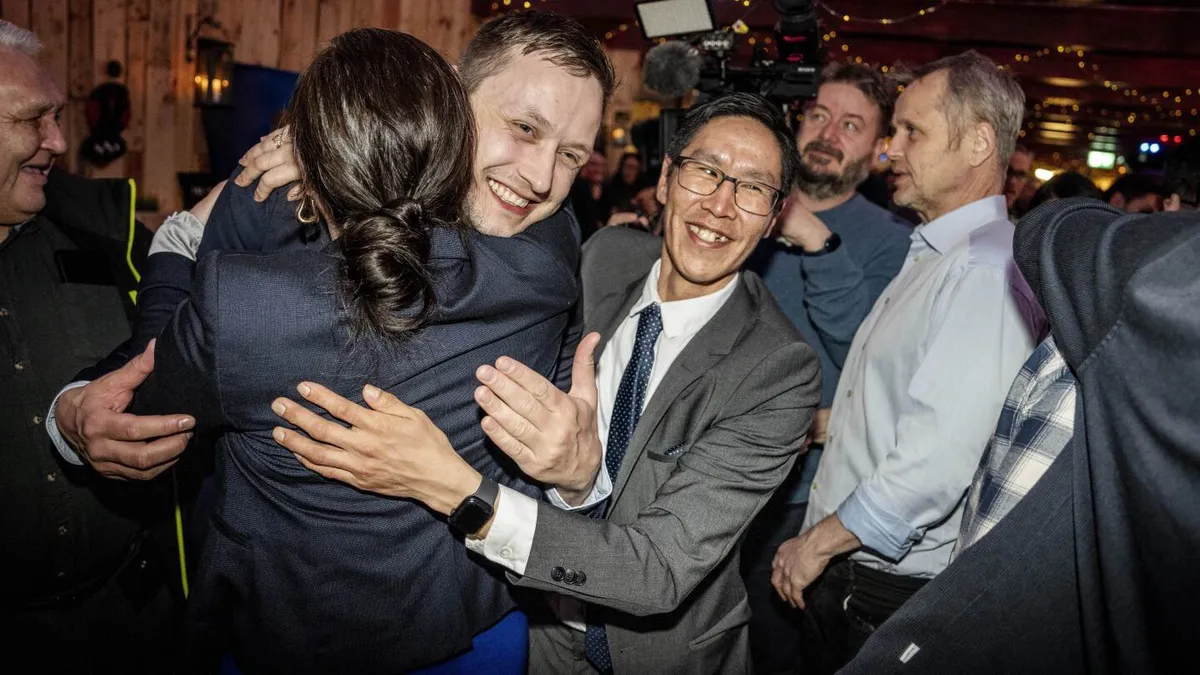
In a decisive move reflecting the island's desire for autonomy, Greenland's likely new prime minister, Jens-Frederik Nielsen, firmly rejected U.S. President Donald Trump's recent attempts to assert control over Greenland. He emphasized that the future of the island should be determined by its own people, especially as Greenland makes strides towards independence from Denmark. The pro-business party Demokraatit, led by Nielsen, achieved a surprising victory in the recent parliamentary elections, surpassing the two left-leaning parties that previously held power.
The parliamentary elections revealed a strong sentiment among Greenlanders, with most opposing Trump’s overtures. Instead of focusing on geopolitics, the campaign primarily addressed pressing domestic issues such as healthcare and education. In response to Trump’s remarks at a joint session of Congress, where he highlighted Greenland's strategic importance for U.S. national security, Nielsen stated, “We don’t want to be Americans. No, we don’t want to be Danes. We want to be Greenlanders, and we want our own independence in the future.” This underscores the growing desire among Greenlanders for self-determination.
Greenland, currently a self-governing region of Denmark, has been on a path towards independence since 2009 when the Danish government acknowledged its right to self-determination under international law. In the recent elections, four out of five major political parties supported independence, although their views on the timeline and process varied significantly. With a population of approximately 56,000, predominantly of Indigenous Inuit descent, Greenland has gained international attention, especially following Trump’s interest in the island's resources and strategic location.
Greenland's significance lies not just in its geopolitical position but also in its abundant natural resources, including rare-earth minerals essential for technologies ranging from mobile devices to renewable energy solutions. Despite this international focus, the election campaign did not center around Trump's ambitions. Instead, the newly elected parliament, consisting of 31 members, will prioritize local issues such as economic diversification, infrastructure development, and healthcare improvements, in addition to strategizing against the challenges posed by Trump's America First agenda.
Demokraatit secured 29.9% of the vote by advocating for improved housing and educational standards while proposing a gradual approach to independence until Greenland can achieve economic self-sufficiency. This marked a significant increase from the party’s previous standing, where it garnered only 9.1% of the vote four years ago. Local resident Anthon Nielsen expressed optimism, stating, “Most politicians want Greenland to be independent, but this party who won, they don’t want to hurry things so everything must be done right.”
According to Carina Ren, head of the Arctic program at Aalborg University in Copenhagen, the election results indicate that Greenlanders preferred to concentrate on local concerns rather than external pressures. “The voters have been able to drag down all the drama, all the alarmist talk from the outside to say, ‘Well, this is about our everyday lives, our everyday concerns as citizens,’” Ren noted. This reflects a growing political maturity among Greenlanders as they navigate their future.
As Demokraatit prepares to form a governing coalition, it faces the challenge of deciding with which party to align. The second-place party, Naleraq, known for its strong pro-independence stance, received 24.5% of the votes, while Inuit Ataqatigiit, the previous ruling party, garnered 21.4%. Dwayne Menezes, managing director of the Polar Research and Policy Initiative, remarked, “What approach to independence will win the day will ultimately depend on if Demokraatit decides to form a coalition government and with which party.”
Nielsen appeared pleasantly surprised by Demokraatit’s electoral success, celebrating with supporters at a post-election gathering. He expressed intentions to engage in discussions with other parties to negotiate Greenland’s political future. Meanwhile, Danish Defense Minister Troels Lund Poulsen congratulated the new government and cautioned that it would likely face significant pressure from Trump regarding Greenland’s future. “It’s not the case that you can just take part of the Danish Realm,” he stated, emphasizing that the future must align with the desires of the Greenlandic people.
Former Prime Minister Mute Bourup Egede had called for early elections, highlighting the need for unity during these unprecedented times. Following the election results, Egede took to social media to thank voters for their participation and expressed readiness among parties to begin negotiations to form a new government. As Greenland moves towards a future of greater autonomy, the focus remains on empowering its citizens to shape their own destiny.